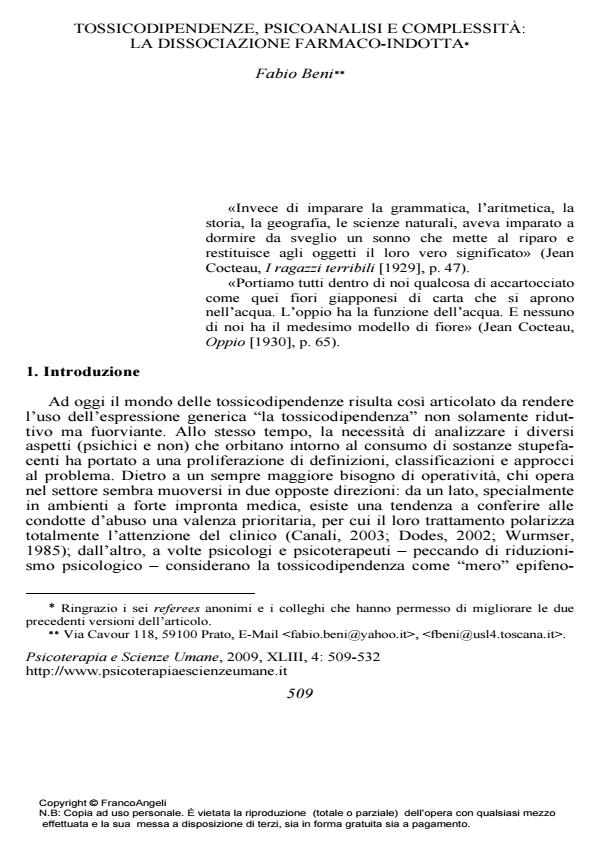Tossicodipendenze, psicoanalisi e complessità: la dissociazione farmaco-indotta
Journal title PSICOTERAPIA E SCIENZE UMANE
Author/s Fabio Beni
Publishing Year 2009 Issue 2009/4
Language Italian Pages 24 P. 509-532 File size 464 KB
DOI 10.3280/PU2009-004004
DOI is like a bar code for intellectual property: to have more infomation
click here
Below, you can see the article first page
If you want to buy this article in PDF format, you can do it, following the instructions to buy download credits

FrancoAngeli is member of Publishers International Linking Association, Inc (PILA), a not-for-profit association which run the CrossRef service enabling links to and from online scholarly content.
Drug addictions, psychoanalysis, and complexity theory: substance-induced dissociation - Drug addictions are understood, within a perspective of interpersonal psychoanalysis, taking into consideration dissociative mechanisms within a framework inspired by nonlinear dynamics theories. Considering the present situation in which psychoanalytic therapy is almost excluded from the treatment of drug addictions, in an attempt of resuming a dialogue with psychoanalysis it is assumed that drug addiction are the driving force of a particular dissociative mechanism. The perturbation connected in a nonlinear way to the effect of the drug originates and preserves a dissociative process, depicted through the concept of self-organization, an idea adopted from complexity theory. Drug addiction would therefore be especially sensitive to those psychotherapeutic approaches, such as interpersonal psychoanalysis, that emphasize the concept of dissociation.
Keywords: Drug addictions, dissociation, nonlinear dynamics systems, interpersonal psychoanalysis, selforganization
- La dissociazione farmaco-indotta: l'orpha "chimico" come base di una nuova tecnologia analitica Fabio Beni, Daniele Santoni, in RICERCA PSICOANALITICA 1/2014 pp.55
DOI: 10.3280/RPR2014-001005
Fabio Beni, Tossicodipendenze, psicoanalisi e complessità: la dissociazione farmaco-indotta in "PSICOTERAPIA E SCIENZE UMANE" 4/2009, pp 509-532, DOI: 10.3280/PU2009-004004